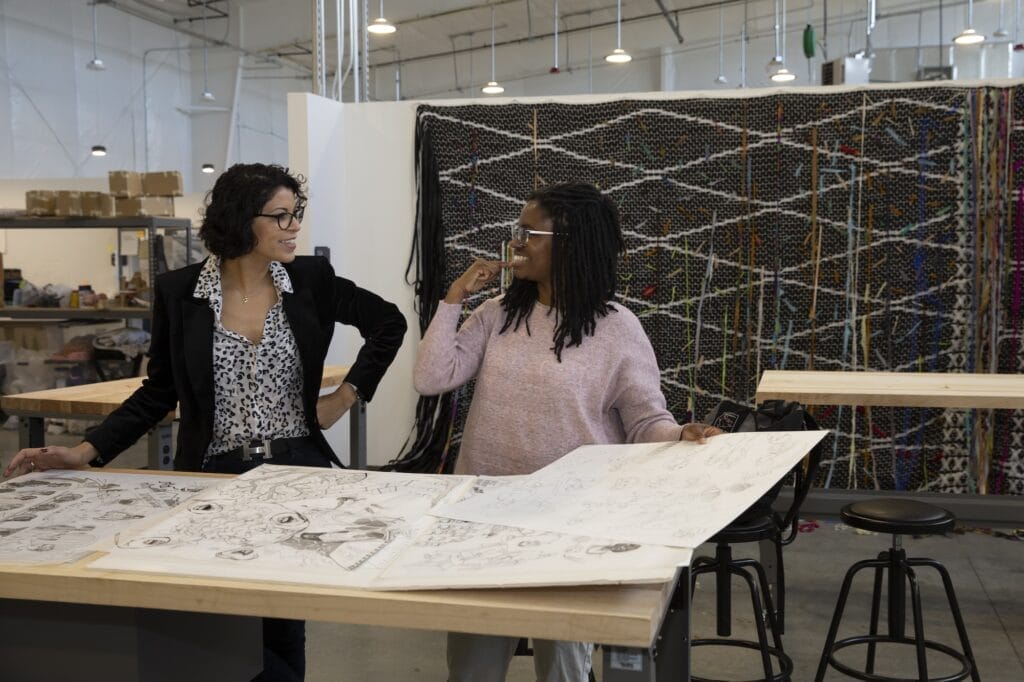
Flavia Bastos (left) and alumna Lataushsa Cox (right) engaged in a studio discussion of Cox’s artwork when she was a graduate student.
Meet Flávia Bastos—Local Learning Board Member
“I think arts and creativity are really where life becomes interesting.”
As Distinguished Research Professor in the Arts and Humanities in the Art Education Program in the School of Art, College of Design, Architecture, Art, and Planning (DAAP) and Provost Fellow at the University of Cincinnati, Flávia Bastos brings deep experience in and knowledge of the importance of community-based art and learning to the Local Learning Board. Her research and scholarship are indebted to her Brazilian roots and her commitment to social justice. Her courses range from Arts-Based Research to Community Dance. She is past senior editor of the Journal of Art Education and has published and lectured extensively internationally. She and former LL Board Chair Doug Blandy are editors of the new book Promoting Civic Engagement Through Art Education: A Call to Action for Creative Educators (Routledge, 2024).
We asked Flávia to relay to our readers how her work intersects with that of Local Learning and the field of folklore. We share here her thoughtful insights with gratitude for her contributions.
- What do understanding and calling upon the relationship of community-based, local, and traditional art and artists bring to art education?
Well, that is the cornerstone of my work. I have been motivated to advance an inclusive notion of art that encompasses a broad spectrum of artistic activities and a variety of purposes. So much of contemporary art education is about understanding contemporary fine art (which I love), but sometimes at the expense of promoting students’ and learners’ connection with the human drive to create art and an awareness that art is all around us. Focusing on community-based, local, and traditional arts is critical for promoting students’ understating of the cultural and artistic traditions that surround them; it changes the locus of art from a market-driven, elitist experience to something that belongs to all. Additionally, the skills needed to learn about local arts require critical thinking and inquiry skills that will be valuable throughout a learner’s lifetime. There is something powerful about local learners doing ethnography about their own communities and accessing the knowledge that resides in local folks, many times their neighbors and family members. It is an empowering practice of learning about where you come from.
- How does the work of Local Learning and our ethnographic approach to education connect with higher education and professional development for teachers?
The quest for meaningful activity is shared among all of us. Teachers are often so overwhelmed with multiple demands and concerns that they struggle to teach in meaningful ways. When I work preparing future educators or future art education scholars, I emphasize the importance to start with who they are, taking stock of their life experiences and values. When this works, there is so much energy that is released and my students find a sense of direction and purpose. They can model for their own students the reflection and inquiry skills needed to understand local, national, and global cultures in the ways that they show up today and connect them with historical and traditional practices. It’s about asking why. Why do I think or behave this way? Why do I prefer this versus that? What experiences made me make these decisions? This search for meaning and the realization that the objects and practices we develop in the world carry meaning, makes the process of seeking to unveil it exhilarating.
I have been thinking a lot about the future of education as we face this AI revolution. On the one hand, we will be able to retrieve information more easily, but we have to face the risk that this information will reproduce all the biases of the content in which AI was trained. Therefore, the future of education, in my opinion, will not be about mastery of content. It will be about the development of inquiry and creative skills that allow us to search for deep meaning, and to leverage the tools of AI to forge a better, more equitable future. For that to take place, it is paramount that we remain wide awake and cultivate the intellectual and relationship habits of relentless curiosity and imagination.
- What would you like those of us in the field of folklore to know about Paulo Freire, the Brazilian philosopher and educator? How do you think our work dovetails with his philosophy? What might we learn from him?
Freire’s philosophy of education honors local knowledge and local learners. He embraced an inclusive notion of knowledge that included on the one hand academic knowledge, in particular critical literacy as a methodology for making sense of the world (community) that we inhabit. My work on community-based art education draws on Freire’s concept of education as a process of critical consciousness. This is relevant for folklorists to reflect about the goals of ethnography beyond documenting and preserving traditions. Our ability to learn about our own culture unleashes reflection and invites change. It is a gateway for transformation, and (I deeply hope) for promoting social justice. We can learn from Freire that education is political, and it empowers those involved to become agents of change. I think that rekindling that commitment to educational practices that at all levels promote civic and political engagement is much needed today to cope and address the global and local challenges that we face.
